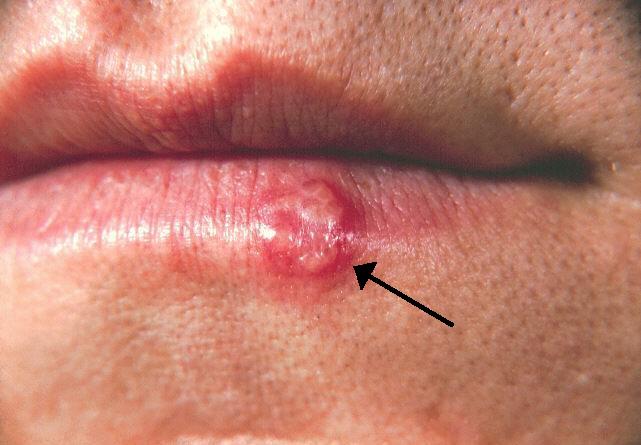
Image: "Herpes" by the Centers for Disease Control and Prevention (CDC) is in the public domain. Link to the source.
Oral Herpes Simplex (Cold Sores)
Introduction
Oral herpes simplex, commonly known as cold sores, is an infection caused by the herpes simplex virus (HSV), most often HSV-1. This condition presents as painful blisters or ulcers around the lips, mouth, or gums. Oral herpes is highly contagious and can recur throughout life, triggered by factors such as stress, illness, or sun exposure.
Aetiology and Pathophysiology
Oral herpes is primarily caused by the herpes simplex virus type 1 (HSV-1), though HSV-2, typically associated with genital herpes, can also cause oral lesions:
- Initial Infection: The virus is transmitted through direct contact with infected saliva, mucous membranes, or skin. After the initial infection, the virus travels along the sensory nerves to the trigeminal ganglion, where it becomes latent.
- Reactivation: The virus can reactivate due to various triggers, such as stress, fever, ultraviolet (UV) light, or immunosuppression. Reactivation leads to the virus traveling back to the skin or mucosa, causing recurrent lesions.
- Risk Factors: Common risk factors include close contact with someone who has an active outbreak, immunosuppression, hormonal changes, and environmental factors such as exposure to sunlight.
Clinical Presentation
Oral herpes simplex typically presents with the following features:
- Prodromal Symptoms: Many patients experience tingling, itching, or burning sensations around the mouth or lips a few hours to a day before the lesions appear.
- Blisters: Small, fluid-filled blisters appear on or around the lips, nose, or inside the mouth. These blisters are usually painful and may be accompanied by redness and swelling.
- Ulcers: The blisters eventually rupture, leading to shallow, painful ulcers that crust over and heal within 7-10 days.
- Systemic Symptoms: In primary infections, especially in children, systemic symptoms such as fever, malaise, and lymphadenopathy may be present. Gingivostomatitis, a severe form of primary oral herpes, can also occur, characterised by extensive oral ulcers and difficulty eating.
- Recurrence: Recurrent episodes tend to be less severe than the primary infection and are often limited to the same area.
Diagnosis
The diagnosis of oral herpes is usually clinical, based on the characteristic appearance of the lesions and patient history. However, certain tests can confirm the diagnosis if needed:
- Clinical Examination: The typical presentation of grouped vesicles on an erythematous base is usually sufficient for diagnosis.
- Viral Culture: A swab of the blister can be cultured to isolate the virus, although this is less commonly done in routine practice.
- Polymerase Chain Reaction (PCR): PCR testing is more sensitive than viral culture and can detect HSV DNA from lesion swabs, especially in cases where rapid confirmation is needed.
- Serology: Blood tests to detect HSV antibodies can indicate past exposure to the virus but are not useful for diagnosing an active outbreak.
Management and Treatment
Management of oral herpes simplex focuses on relieving symptoms, reducing the duration of the outbreak, and preventing recurrences:
1. Symptomatic Treatment
- Topical Antivirals: Topical aciclovir 5% cream or penciclovir 1% cream can be applied to the affected area at the first sign of an outbreak. These treatments can reduce the duration of symptoms if started early.
- Oral Antivirals: Oral antiviral medications such as aciclovir, valaciclovir, or famciclovir are more effective than topical treatments, especially for frequent or severe outbreaks. These should be taken at the first sign of prodromal symptoms.
- Pain Relief: Over-the-counter analgesics such as paracetamol or ibuprofen can help manage pain. Topical lidocaine or benzocaine gels can also provide temporary relief.
- Hydration: Encourage patients, especially children with gingivostomatitis, to maintain good hydration, as oral intake may be painful during an outbreak.
2. Preventive Measures
- Trigger Avoidance: Patients should be advised to avoid known triggers, such as excessive sun exposure, stress, or illness, that may precipitate an outbreak.
- Sun Protection: Using lip balm or sunscreen on the lips can help prevent UV-induced reactivation of the virus.
- Prophylactic Antivirals: In cases of frequent recurrences (e.g., more than 6 episodes per year), daily suppressive therapy with oral antivirals such as aciclovir or valaciclovir may be recommended.
- Hygiene Practices: Patients should avoid touching the sores and wash their hands frequently to prevent the spread of the virus to other body parts or to other people.
When to Refer
Referral to a specialist may be necessary in the following situations:
- Severe or Recurrent Infections: Patients with frequent, severe, or refractory outbreaks may benefit from specialist advice, including the consideration of long-term antiviral prophylaxis.
- Immunocompromised Patients: Immunocompromised individuals, such as those with HIV or those undergoing chemotherapy, may require specialist care due to the risk of severe, disseminated HSV infection.
- Complications: Referral is indicated if complications such as herpetic keratitis (infection of the eye), eczema herpeticum, or bacterial superinfection of the lesions occur.
References
- British Association of Dermatologists (2024) Guidelines for the Management of Herpes Simplex Virus Infections. Available at: https://www.bad.org.uk (Accessed: 26 August 2024).
- National Institute for Health and Care Excellence (2024) Herpes Simplex: Diagnosis and Management. Available at: https://www.nice.org.uk/guidance/ng97 (Accessed: 26 August 2024).
- British National Formulary (2024) Antiviral Treatments for Herpes Simplex. Available at: https://bnf.nice.org.uk/ (Accessed: 26 August 2024).
Check out our YouTube channel
Blueprint Page
Explore the comprehensive blueprint for Physician Associates, covering all essential topics and resources.
Book Your Session
Enhance your skills with personalised tutoring sessions tailored for Physician Associates.



